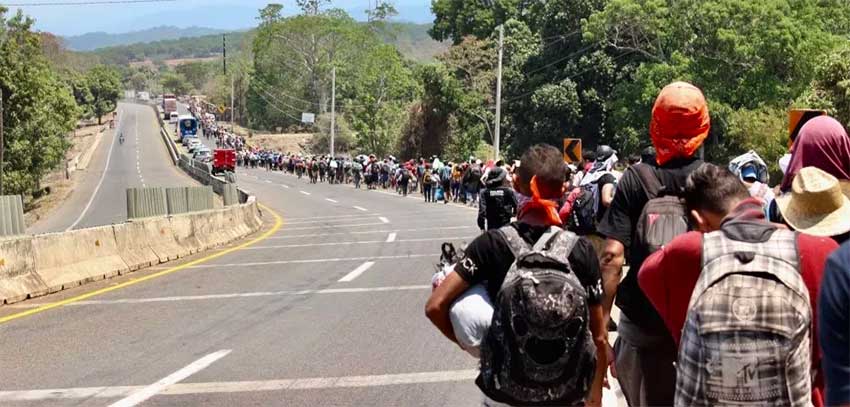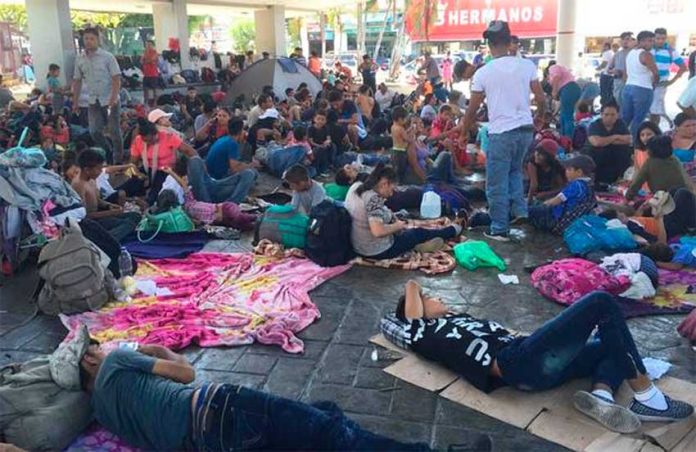Mexican authorities have begun implementing stricter immigration policies amid pressure from the United States to stop the flow of migrants from Central America.
When he took office in December, President López Obrador pledged that his government would treat migrants more humanely than that of his predecessor, Enrique Peña Nieto.
In January, his administration issued around 13,000 humanitarian visas to migrants who entered Mexico at the southern border that month.
The visas allow recipients to work and access services in Mexico for up to a year or, if they choose, travel legally to the northern border to apply for asylum in the United States.
The National Immigration Institute (INM) issued a few thousand additional visas in February but none since, an immigration official who requested anonymity told the news agency Reuters.
According to other sources familiar with Mexican immigration policy who also spoke to Reuters, near-daily pressure from the United States government has resulted in the secretariats of the Interior (Segob) and Foreign Affairs (SRE) pushing the INM to adopt a tougher approach towards migrants.
On April 4, United States President Donald Trump claimed that Mexican authorities had taken note of his threats to shut the border, stating that Mexico had recently been “capturing people and bringing them back to their countries at their southern border.”
Indeed, detentions of undocumented migrants for registration increased to 12,746 last month, according to unreleased INM data seen by Reuters, an increase of almost one-third compared to February and two-thirds compared to January.
The INM says that migrants staying at its facilities are not detained but being held for processing but rights groups and the migrants themselves say that they are not free to leave.
Thousands of migrants have been stranded in Chiapas, especially Tapachula and Mapastepec, as they wait to see if they will be granted humanitarian visas, or at least 20-day transit visas that allow them to legally travel through Mexico.
In the latter town, some of the migrants have been staying inside a makeshift shelter set up inside a sports stadium for almost three weeks, while others have camped in a field opposite.

“It’s madness that they’re making us wait so long. For what? For nothing!” said Daisy Maldonado, a 26-year-old from Honduras who traveled to Mexico with her five-year-old daughter.
With migrants facing oppressive conditions in high temperatures – those camping in the field have no ready access to water, medical attention or government assistance – a coalition of more than a dozen human rights and humanitarian aid groups warn that there is a “humanitarian crisis” unfolding in Chiapas.
The coalition said that the detention center in Tapachula is severely overcrowded and that the confusion over whether visas will be issued or not is worsening the migrants’ plight.
“The government is responding with practices and repressive methods similar to the previous administration in terms of control and deportation, but in a way that’s even more disorderly [and] in some ways, it’s worse,” said Salva Lacruz, a coordinator of the Fray Matias de Cordova migrant advocacy group.
INM Commissioner Tonatiuh Guillén López said in a recent interview that a “stricter” immigration approach was being adopted in the south of Mexico due to the large number of arrivals but he denied that it was a result of pressure from the United States.
Whereas migrants were once effectively given free passage to travel through Mexico, the INM said yesterday that the migrants in Mapastepec would only be able to request seven-day visas that will limit their legal stay to Mexico’s southern states.
It is unclear when migrants in Tapachula might be issued visas as the INM office in that city closed following a riot last month. Thousands more migrants are stranded in cities on Mexico’s northern border.
In addition to detaining migrants, immigration authorities are also deporting them.
Two large groups of migrants – 204 from Honduras and 148 from Cuba – were deported from Mexico in recent days after they were located traveling through the country without having first regularized their immigration status.
“Migration officials are grabbing us like pigs,” said Erick Morazan, a 28-year-old Honduran migrant who traveled to Mapastepec at night in a “caravan of zombies” to avoid detection by immigration officials and the possibility of deportation.
Source: Reuters (sp)
